Blueberries are sweet, nutritious, and a beloved summer berry. They are legitimately known as “superfoods” because they are low in calories but extremely rich in beneficial substances. The health benefits of blueberries have been known since ancient times, and scientific studies have confirmed this. Blueberry juice is an option to incorporate this “superfood” into your diet. Make this beverage from fresh or frozen blueberries picked in forests, and your body will thank you!
Blueberry—The Berry of The Forests
The blueberry (Vaccinium myrtillus) is a semi-shrub that greens up in the summer with branching, upward-reaching branches. The leaves are oval and glossy. It blooms with white, cup-shaped flowers. The flowering season begins in May and continues until mid-June. The berries ripen in July. At this time, they are at their tastiest and most valuable.
So, with summer in full swing, it’s time to look for bright blue ‘superberries’ in forests. Blueberries are most common in moist coniferous forests, closer to wetland areas. These berries are well worth picking. Frozen blueberries will provide an invaluable source of vitamins throughout the winter.
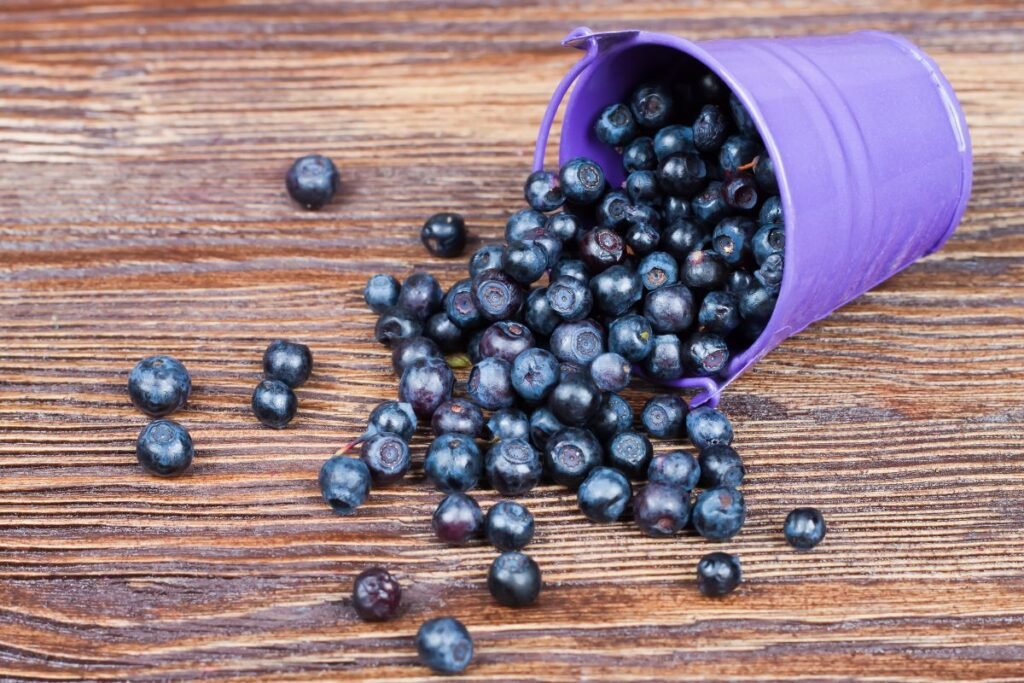
Blueberries Are A Source of Nutrients
Blueberries are one of the most nutritious berries. One cup of blueberries or blueberry juice contains 24% of the daily intake of vitamin K (phylloquinone), 22% of the daily manganese intake, and 16% of the daily vitamin C dose. A serving of blueberries also contains 3.6 g of fiber, essential for a healthy intestine. One cup of blueberries or blueberry juice also provides 21.5 grams of carbohydrates and only 84 calories.
Blueberries also contain other essential nutrients for the human body: calcium, iron, magnesium, phosphorus, potassium, zinc, and copper. Blueberries have the most potent antioxidants in their nutrients and compounds. This is why blueberries are considered to be the elixir of youth.
Blueberry Juice: Antioxidants That Stop Aging
Blueberries are a prime source of antioxidants. These berries contain the highest antioxidant content compared to other berries (for example, raspberries and raspberry juice) or fruits.
Antioxidants are substances that fight free radical damage to the human body. Free radicals are unstable molecules that bind to the body’s cells and destabilize their healthy functioning. These processes lead to faster aging and influence the development of diseases such as cancer.
Blueberries’ antioxidants belong to the polyphenol group flavonoids. The anthocyanins (one group of flavonoids) are responsible for most of the remarkable flavors in blueberries. Scientists prove that blueberries significantly increase body resistance to free radicals.
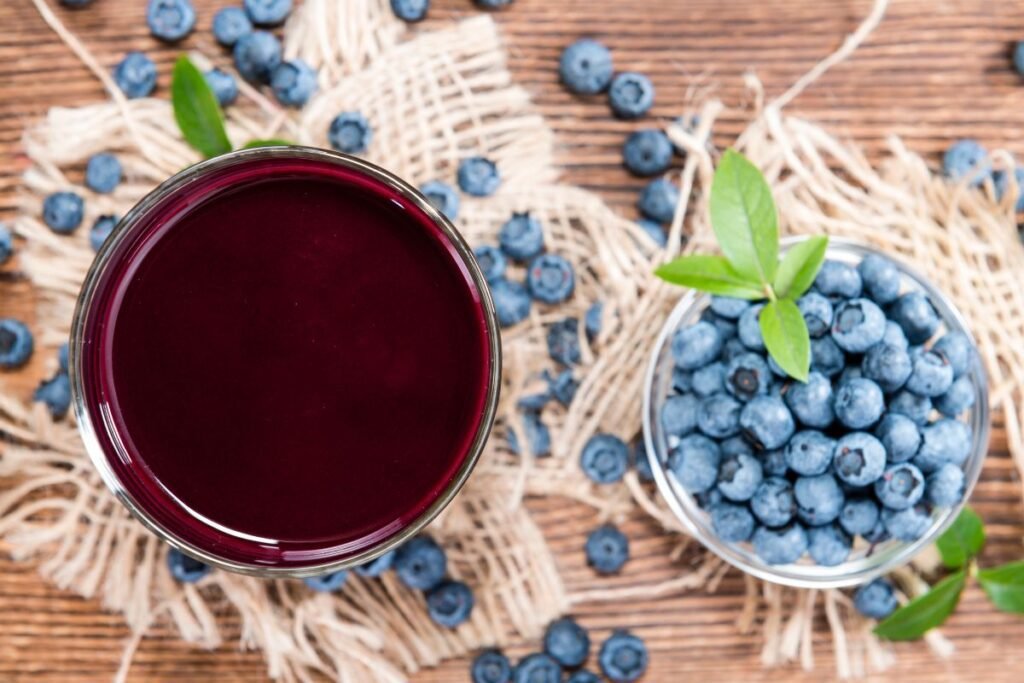
Blueberry Juice in The Daily Diet Leads to Better Health
Nutrient-rich blueberry juice can positively affect cardiovascular health and brain function, aiding the body’s recovery and much more. Scientific research supports these claims. There is no doubt about the health benefits of blueberries.
Incorporating blueberry juice into your daily diet can be an excellent preventive measure to maintain health. The benefits of blueberries include:
- Antioxidant effects
- Prevention of oncological diseases
- Balancing blood sugar levels
- Lowering blood cholesterol levels
- Maintaining normal blood pressure
- Antibacterial activity
- Sustaining liver function
- Improving memory and supporting brain function
Blueberry Juice Benefits for Sports
Muscle pain and discomfort after strenuous exercise are warning signs of overstretching and inflammatory processes. Blueberry juice consumption can help the body cope with this oxidative stress.
The antioxidants help reduce muscle damage caused by intense exercise. This helps reduce muscle soreness and allows muscles to recover faster.
A small study involving ten female athletes confirmed the effect of blueberry juice on faster recovery. Blueberry juice accelerated muscle recovery after intense leg exercises.
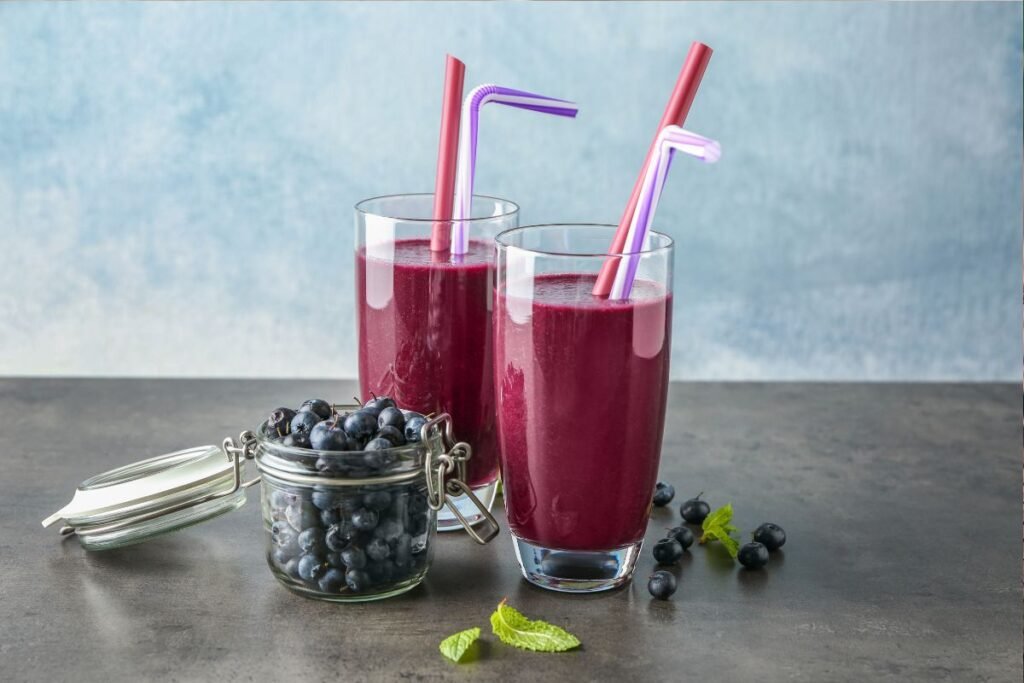
How to Make Blueberry Juice?
A glass of homemade blueberry juice is an authentic vitamin bomb. In addition to its health benefits, blueberry juice has a pleasant taste and a distinctive, bright color. Blueberry juice is likewise reduced in calories.
Blueberry juice is one of the easiest ways to incorporate these delicious berries into your diet. This juice can be a quick but healthy breakfast, snack, or dessert.
Both fresh and frozen berries are suitable for making freshly squeezed blueberry juice. This juice is diluted with water. People advise using a bit of lemon juice for a perfectly balanced taste.
You need:
- 1 cup of blueberries
- a cup of water
- 1 tablespoon of fresh lemon juice
- Place all the ingredients in a cocktail shaker (or food processor) and blend until smooth.
- Strain the prepared juice through a sieve and serve. However, blueberry juice is more valuable with pulp and skins.
- Fresh blueberry juice is the tastiest and most valuable. Consume it only when squeezed. It is not recommended to store this juice for prolonged periods as it thickens quickly and changes its taste.
Freezing Blueberries: Solution for Preparing Valuable Supplies
Blueberries, which are full of beneficial substances, are best consumed fresh. However, we can only afford this luxury for one month of the year. At that time, we can pick these berries and freeze them. This is a much more valuable way to stock up on blueberries than, for example, cooking jams or making syrups. The berries lose many of their beneficial substances when cooked. Frozen berries are almost fresh and appropriate for juices, baked goods, and other gastronomic ideas.
Freezing blueberries has another advantage. Freezing creates ice crystals inside the berries, which release additional blue and purple pigments. This results in a brighter, more concentrated color for these berries. Frozen blueberries result in a more intense color. Thus, frozen blueberries are a natural food coloring that produces a bright and intense blue-purple color.
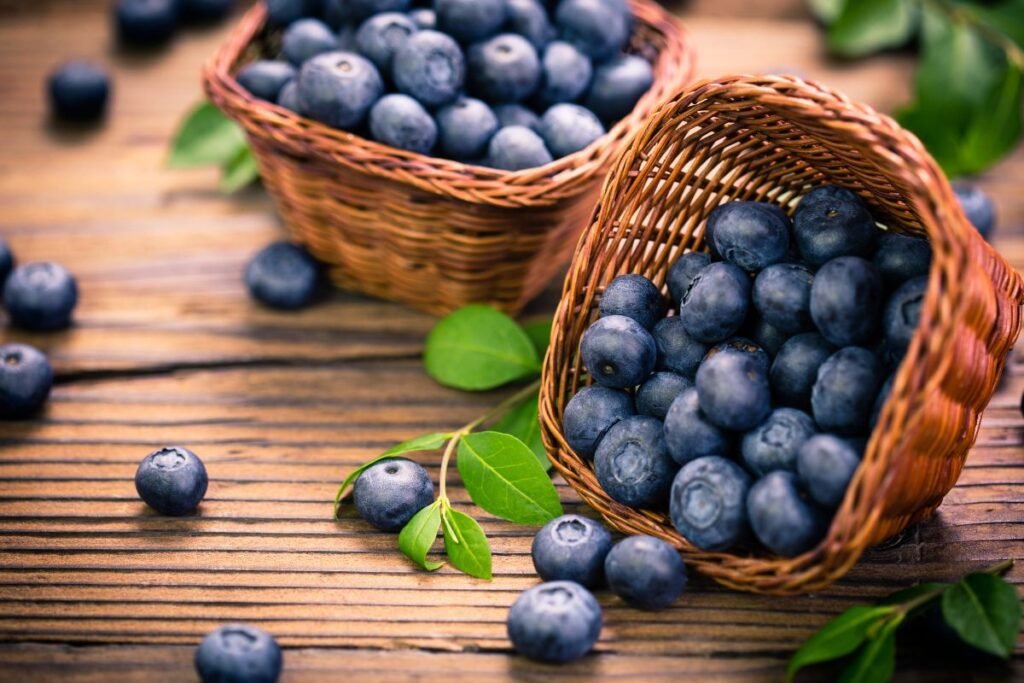
Homemade Lemonade with Blueberry Juice
Blueberry juice can be an ingredient in homemade lemonade. Make a healthy, refreshing drink with a unique color using merely a few ingredients. This lemonade has a balanced taste with a perfect combination of mild acidity and light sweetness.
Ingredients for lemonade:
- Fresh or frozen blueberries. Fresh blueberries, when ripe, will add more sweetness. Frozen blueberries will be more acidic but will give a richer purple color to the drink.
- Cold water. Use boiled, chilled, or filtered water. Use 3–4 cups of water per pitcher of lemonade.
- Sugar or other sweetener of your choice—to taste and as needed.
- Freshly squeezed lemon juice. The amount of lemon juice depends on how much lemonade you are making. Half a lemon is enough for one pitcher of lemonade.
- A pinch of sea salt. This will help balance the sweet and sour flavors and give the drink a refreshing taste.
Preparation:
- Place all the ingredients in a cocktail shaker or food processor, and puree until smooth.
- Pour the liquid through a sieve into a glass.
- Chill the mixture before serving or use ice cubes (if wanted).
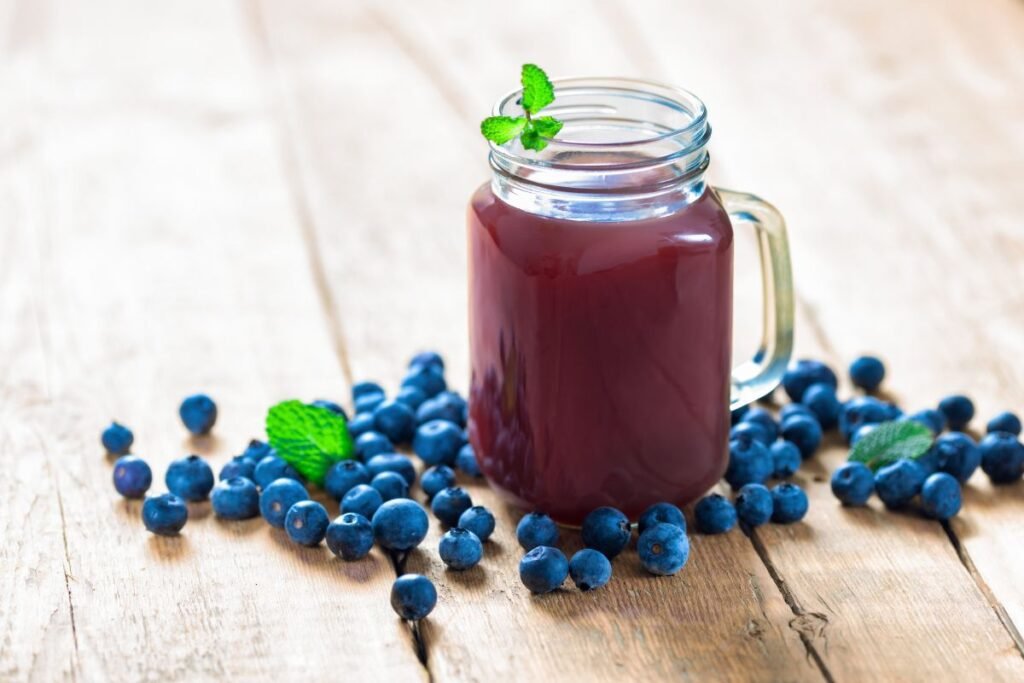
Possible Side Effects of Blueberry Juice
Moderate consumption of blueberry juice is very beneficial to human health. However, do not abuse blueberry juice and overdo it. An overdose of blueberry juice can have adverse effects. Most often, this can manifest itself in allergic reactions.
Do not give blueberry juice to young children due to possible allergenicity. Blueberry juice should also be limited to pregnant and breastfeeding women.
These juices may interfere with blood thinners and increase the risk of bleeding. Blueberry juice should also be limited for people taking blood pressure-lowering drugs.
Sources:
- https://www.ncbi.nlm.nih.gov/pmc/articles/PMC7442370/
- https://pubmed.ncbi.nlm.nih.gov/10995120/
- https://pubmed.ncbi.nlm.nih.gov/22175691/
- https://pubmed.ncbi.nlm.nih.gov/17602170/
- https://pubmed.ncbi.nlm.nih.gov/22733001/
- https://www.sciencedirect.com/science/article/abs/pii/S0271531713000031?via%3Dihub
- https://www.sciencedirect.com/science/article/pii/S0022316622072017?via%3Dihub
- https://doi.org/10.1017/S0007114512003650
- https://www.sciencedirect.com/science/article/pii/S0022316622072017?via%3Dihub
- https://www.ncbi.nlm.nih.gov/pmc/articles/PMC3139238/
- https://www.ncbi.nlm.nih.gov/pmc/articles/PMC3583121/
- https://www.healthline.com/nutrition/10-proven-benefits-of-blueberries
Associative photos © Canva
